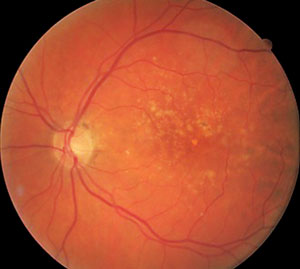 | |
| The new trial holds promise for a new treatment modality for wet AMD. Photo: Julie Rodman, OD, MS. |
Last month, a new trial began following the surgical delivery of stem-cell derived retinal pigment epithelial (RPE) cells into the retina of a patient, as part of a collaboration between the London Project to cure blindness, the University College London (UCL) and Pfizer. The trial will evaluate the validity of the procedure as a treatment modality for severe sudden vision loss due to neovascular age-related macular degeneration (AMD). The surgery used a special patch behind the retina to facilitate transplantation of the RPE cells.
Lyndon Da Cruz, PhD, retinal surgeon for the operations and co-leader of the London Project, said in a UCL press release that there is real potential that people with wet AMD will benefit in the future from transplantation of RPE cells.
The trial will recruit 10 patients in total over a period of 18 months. Each patient will be followed for a year to assess the safety and stability of the cells and whether there is any restoration of vision.
“If successful, this will have huge ramifications,” says Jeffry D. Gerson, OD.
AMD is the leading cause of legal blindness in seniors and there is currently no treatment for geographic atrophy, and this could be a potential treatment for that and also for scarring from wet AMD, he says. “The visual outcome here will be interesting. Success by vision is different than success by anatomy—patients want to end up with good vision. Only time will tell.”
